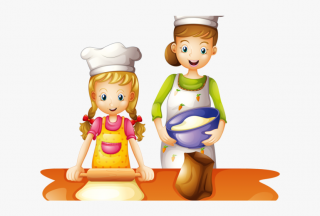When your child cooks with you, they develop a greater interest in food and new flavours. They are also more likely to taste a dish when they have participated in its preparation. In addition, cooking with children allows your child to develop independence, self-confidence, creativity, dexterity and fine motor skills. If your child is a little older, he or she can put into practice concepts learned at school, such as reading, math (units of measurement, fractions, multiplications or divisions if the recipe has to be doubled or reduced, etc.) and science (desserts often involve chemistry). All of this is in addition to learning how to feed himself, which prepares him to take care of himself as an adult.
Tips for cooking with children
Here are some tips and tricks for cooking with kids to follow to ensure the success of this activity:
- Make sure you have enough time. If you are in a hurry, you may feel delayed and stressed. Your patience is an essential ingredient for you and your child to be happy cooking together.
- Involve your child from the moment you choose a recipe. Suggest recipes that they’re sure they’ll like or ask them to choose their favourite recipe from two or three options from a photo recipe book. Occasionally, also suggest a dish they don’t know about. Participating in the preparation of a new dish allows him to discover it, which can help him accept less familiar foods.
- Start with recipes you know.
- Ask for his help in making the grocery list and go to the grocery store with him to get the necessary ingredients. For example, he can check the contents of the refrigerator and pantry to see which ingredients are in and which are missing. If he can write, your child can prepare the grocery list by writing down the foods you dictate. Once at the grocery store, take the opportunity to explain how to choose certain foods.
- Get the kitchen ready before you ask your child to join you. For example, remember to clean all the work surfaces that will be used, take out the ingredients, materials and utensils required. Choose safe utensils according to your child’s age and the tasks you will be doing.
- Separate ingredients, materials and utensils according to the different steps of the recipe.
- Before you start, wash your hands and ask your child to do the same.
- Read the entire recipe to your child before you start. Take this opportunity to explain the meaning of the different terms used. If your child can read or is learning, have him read a few words or lines.
- Try to complete each step of the recipe before moving on to the next one.
- Ask your child to complete certain tasks according to his or her abilities.
- Accept small messes. This is normal as your child is developing his or her skills. Help your child clean up, but don’t do it for them. Make sure that cleaning is not seen as a punishment, but rather as a normal part of dealing with damage.

